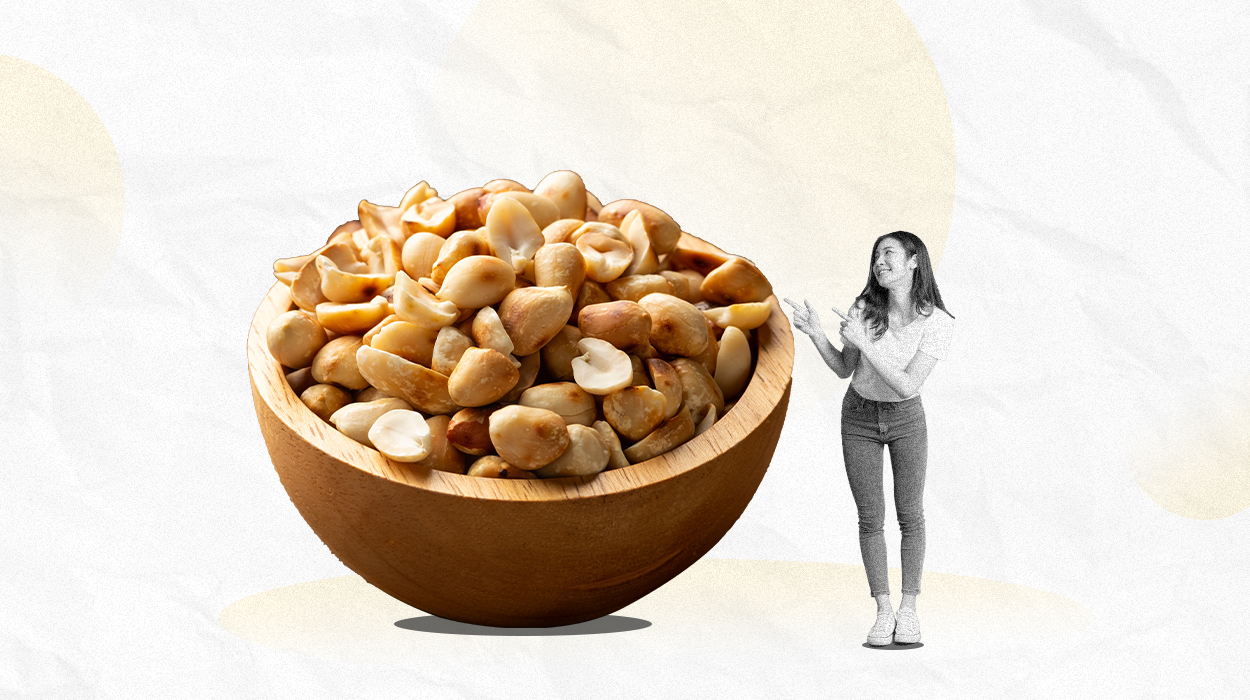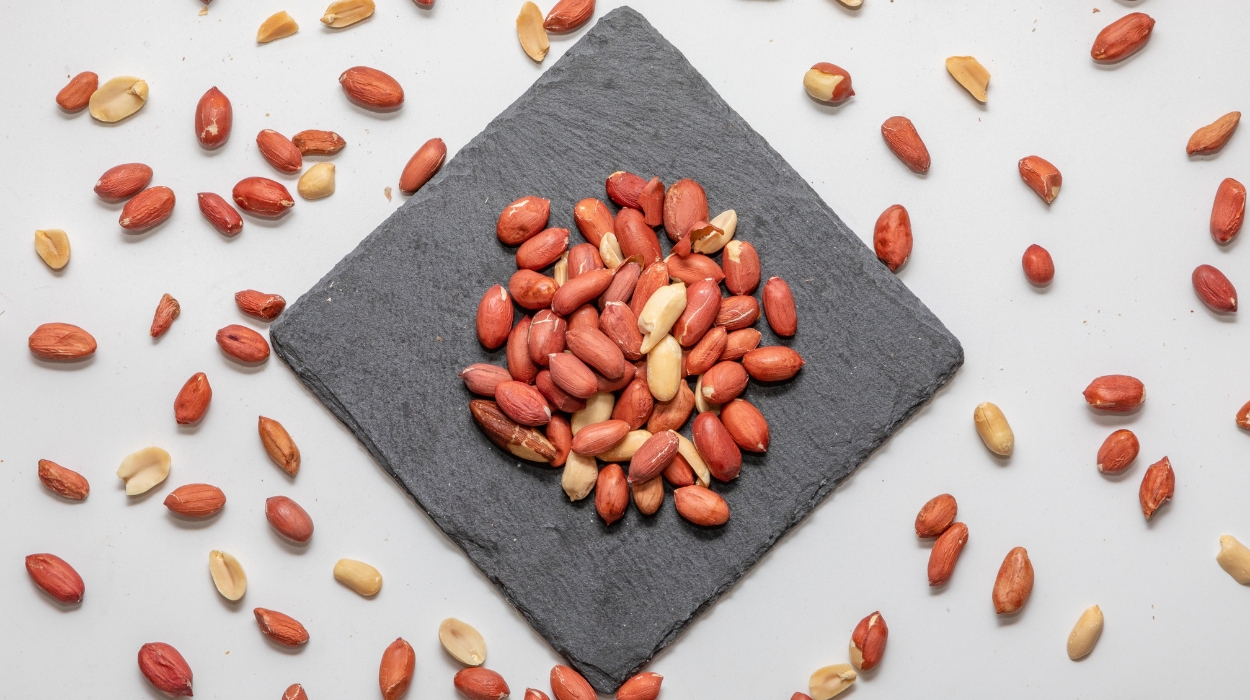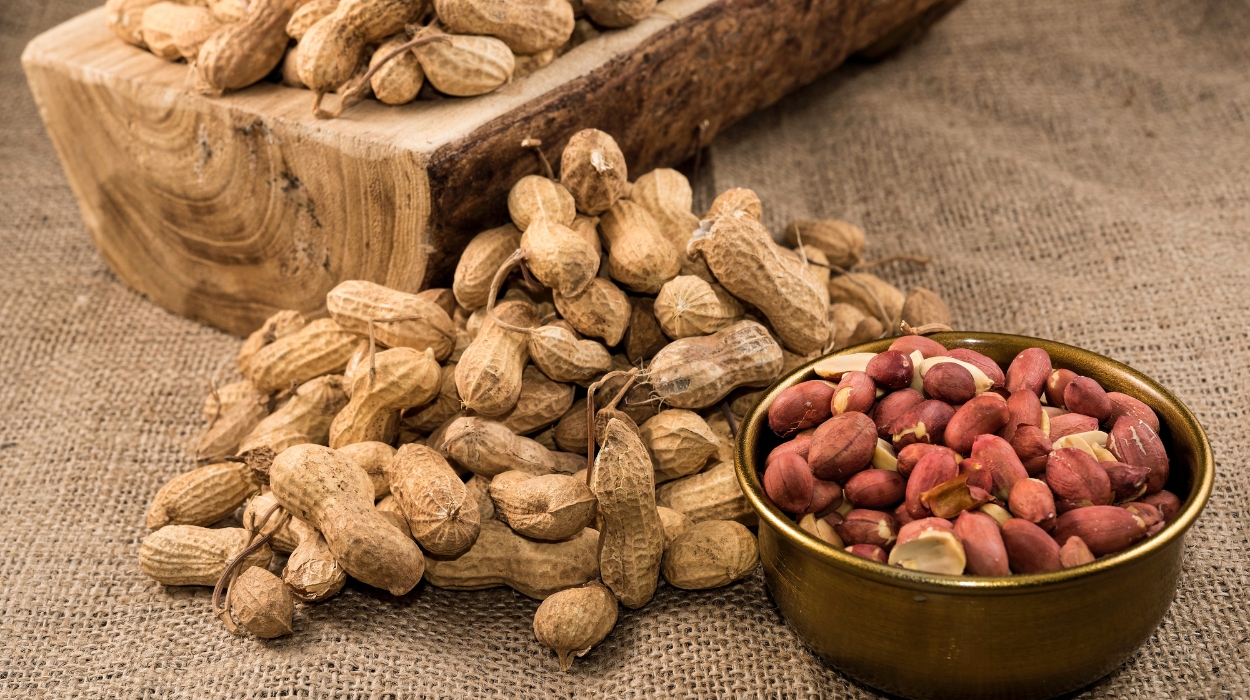 Expert's opinion
Expert's opinion
Expert's opinion
The article is a subjective view on this topic written by writers specializing in medical writing.
It may reflect on a personal journey surrounding struggles with an illness or medical condition, involve product comparisons, diet considerations, or other health-related opinions.
Although the view is entirely that of the writer, it is based on academic experiences and scientific research they have conducted; it is fact-checked by a team of degreed medical experts, and validated by sources attached to the article.
The numbers in parenthesis (1,2,3) will take you to clickable links to related scientific papers.
Are Peanuts Good For You? Benefits & Ways To Use Peanuts 2024

Peanuts are one of the world’s most popular snacks. Although they are high in fat, they also provide a range of health benefits.
Peanuts are high in protein, fiber, and healthy fats, as well as vitamins and minerals, such as vitamin E, magnesium, and potassium. Eating them in moderation can even aid weight loss. However, they are high in calories, so portion control is crucial.
Read on to learn how peanuts are good for you, the side effects of eating too many, and how many you should eat to maximize their health benefits.
Are Peanuts Healthy?
Recent research shows that peanut consumption can help reduce the risk of chronic illnesses including cardiovascular disease[1] and type 2 diabetes.[2]
Raw peanuts[3] are healthiest as they are lower in sodium and fat than roasted or salted peanuts.[4] If you, like most people, prefer roasted, go for dry-roasted rather than oil-roasted for a lower fat content. However, their high-calorie content means moderation is key.
Obviously, people with peanut allergies should avoid them altogether, although boiled peanuts may be used for desensitization therapy.[5]
How Are Peanuts Good For You?
As we’ve just discovered, peanuts are a nutrient-dense food providing numerous benefits for health. Here are some of the key benefits of peanuts:
Lowers Cholesterol Levels
Peanuts are rich in monounsaturated and polyunsaturated fats, considered heart-healthy fats. The phytonutrients in peanuts such as resveratrol can also block the absorption of cholesterol[6] from the diet. These properties mean peanuts may help reduce the levels of LDL-cholesterol in the blood, which can lead to a reduced risk of heart disease.
Research shows that regularly consuming peanuts is associated with lower cholesterol levels, lower blood pressure, and reduced markers of inflammation, all of which are important factors in preventing heart disease.[6] In fact, some heart health experts consider peanuts as important as olive oil.
Lowered Risk Of Diabetes

Peanuts have a low glycemic index,[2] which means they do not cause blood sugar spikes. This makes them a sensible food choice for people with diabetes.
Peanuts also contain magnesium, an important mineral for blood sugar regulation.[7] Studies have shown that consuming peanuts regularly can help lower the risk of developing type 2 diabetes.[6]
Weight Management
Despite their high-calorie content, peanuts can be a good choice for people trying to manage their weight. Peanut protein and fiber levels are high, which can help increase feelings of fullness.
Studies show that eating peanuts can increase energy expenditure by increasing diet-induced thermogenesis,[8] the amount of energy your body uses to digest food.
This energy compensation might explain why[9] those who eat nuts do not tend to gain weight.[10] What’s more, those who consume peanuts daily as part of a weight-loss diet lose as much weight[11] as those who avoid nuts.
Improved Gut Health
Peanuts are a good source of fiber, which is important for maintaining a healthy digestive system. Fiber can help promote the growth of beneficial bacteria in the gut, contributing to improved overall gut health.
Research shows that eating one ounce of peanuts daily for six weeks significantly increases levels of beneficial gut bacteria that produce butyrate,[12] a health-promoting short-chain fatty acid.
Improved Brain Health
One study[13] found that eating around one ounce of peanuts or peanut butter daily for six months significantly improved mental well-being and memory via the gut-brain axis.
After the six months, the young adults in the trial had significantly lower anxiety, depression, and stress scores, and better immediate memory scores.
Peanuts Nutrition Facts
Peanuts are packed with essential nutrients, including:
Protein
Peanuts are rich in protein,[14] which is essential for building and repairing muscle and other body tissues. They contain almost 7 grams of plant-based protein[4] per 1-ounce serving, making them an excellent protein source for vegetarians and vegans.
Healthy Fats

Although peanuts contain fat, most of the fats they naturally contain are good for you. These heart-healthy mono- and polyunsaturated fats can lower low-density lipoprotein cholesterol,[15] commonly known as bad cholesterol. Research shows that regular peanut eaters have lower cholesterol and triglyceride levels.[16]
Fiber
Peanuts are a good source of dietary fiber. Fiber helps lower cholesterol levels, promotes healthy digestion, and balances blood sugar levels.[17] A 1-ounce serving of roasted peanuts contains 2.38 grams of fiber,[4] around 10% of the recommended daily intake of 28 grams[18] on a 2,000-calorie diet.
Essential Vitamins And Minerals
Peanuts provide various vitamins and minerals that are essential to health. They especially provide minerals such as magnesium, phosphorus, potassium, and selenium, which are essential for healthy bones and muscles.[19]
Antioxidants
Peanuts contain phytonutrients, nonessential plant compounds that benefit health. The most well-researched health-promoting phytonutrient peanuts provide is resveratrol.[14] This plant compound is known to have antiaging, and longevity-promoting effects[20] due to its antioxidant, anti-inflammatory, anticancer, and heart-protecting properties.
Calories
One ounce of dry-roasted peanuts provides 166 calories.[4] This is an average amount of calories for a mid-afternoon snack. Plus, it is a heart-healthy snack full of protein and fiber for satiety.
What Types Of Peanuts Are Best For You?
When choosing the best types of peanuts, you need to consider their nutritional value and potential health benefits.
Raw peanuts tend to be the healthiest option due to their lower salt and fat content. High-oleic peanuts might be better for weight management as studies suggest they are more likely to increase fat oxidation.[21]
For protection against age-related diseases, choose red-skinned peanuts. The phytonutrients such as resveratrol tend to be concentrated in the skin.[22]
Salted and roasted peanuts can be high in sodium, increasing the risk of high blood pressure and other health problems.
When eating peanut butter, read the label carefully. Some brands contain added sugar, salt, and unhealthy fats. Look for natural peanut butter containing only peanuts and minimal salt. Natural peanut butter typically has oil floating at the top as it is not hydrogenated.
Raw peanuts and natural peanut butter are the best options for optimal health benefits. However, as part of a healthy diet, roasted peanuts and other peanut products can still be enjoyed in moderation.
Side Effects Of Peanuts
While peanuts are a healthy food, they can cause severe allergic reactions in some people. Peanut allergy[23] is one of the most common food allergies, and it can cause mild to severe symptoms, including:
- Runny nose.
- Symptoms include itchiness, hives, redness, and skin swelling.
- Tingling in the mouth and throat.
- Difficulty breathing or swallowing.
- Anaphylaxis – a severe and potentially life-threatening allergic reaction.
People with peanut allergies should avoid peanuts and all foods that contain peanuts. They should always carry an epinephrine auto-injector in case of an emergency.
How To Eat Peanuts?
While peanuts are a nutritious food, consuming them in moderation and with the right preparation is important to reap their full health benefits.
Here are a few tips on consuming peanuts healthily:
- Choose unsalted peanuts to reduce your sodium intake.
- Roast your own peanuts at home to avoid added oils and preservatives found in store-bought roasted peanuts.
- Pair peanuts with other healthy foods, such as fruits and vegetables, to make a balanced snack.
- Avoid consuming peanuts if you have a peanut allergy.
- As peanuts are high in calories, limit your portion sizes.
Conclusion
So, are peanuts good for you? Yes, peanuts can be a healthy addition to your diet when consumed in moderation. They are a good source of protein, dietary fiber, minerals, and phytonutrients. They can also promote healthy weight management and protect you from cardiovascular disease.
However, it is important to remember that peanuts are also high in calories and fat. Therefore, consuming them in moderation and as part of a balanced diet is recommended. Of course, if you are trying to achieve weight gain and struggle with your caloric intake, peanuts can be a healthier way to do it.
For people with peanut allergies, you need to avoid all peanuts and peanut products. Take care to read labels carefully for products that may include peanuts in their ingredients.
+ 23 sources
Health Canal avoids using tertiary references. We have strict sourcing guidelines and rely on peer-reviewed studies, academic researches from medical associations and institutions. To ensure the accuracy of articles in Health Canal, you can read more about the editorial process here
- Coates, A.M., Hill, A.R. and Tan, S. (2018). Nuts and Cardiovascular Disease Prevention. Current Atherosclerosis Reports, [online] 20(10). doi:https://doi.org/10.1007/s11883-018-0749-3.
- Hou, Y., Ojo, O., Wang, L., Wang, Q., Jiang, Q., Shao, X. and Wang, X. (2018). A Randomized Controlled Trial to Compare the Effect of Peanuts and Almonds on the Cardio-Metabolic and Inflammatory Parameters in Patients with Type 2 Diabetes Mellitus. Nutrients, [online] 10(11), pp.1565–1565. doi:https://doi.org/10.3390/nu10111565.
- Usda.gov. (2023). FoodData Central. [online] Available at: https://fdc.nal.usda.gov/fdc-app.html#/food-details/2515376/nutrients.
- Usda.gov. (2023). FoodData Central. [online] Available at: https://fdc.nal.usda.gov/fdc-app.html#/food-details/174262/nutrients.
- Grzeskowiak, L.E., Tao, B., Kamelya Aliakbari, Nusha Chegeni, Morris, S. and Chataway, T. (2023). Oral immunotherapy using boiled peanuts for treating peanut allergy: An open‐label, single‐arm trial. Clinical & Experimental Allergy, [online] 53(3), pp.327–336. doi:https://doi.org/10.1111/cea.14254.
- Arya, S.S., Salve, A.R. and Chauhan, S. (2015). Peanuts as functional food: a review. Journal of Food Science and Technology, [online] 53(1), pp.31–41. doi:https://doi.org/10.1007/s13197-015-2007-9.
- ELDerawi, W.A., Naser, I.A., Taleb, M.H. and Abutair, A.S. (2018). The Effects of Oral Magnesium Supplementation on Glycemic Response among Type 2 Diabetes Patients. Nutrients, [online] 11(1), pp.44–44. doi:https://doi.org/10.3390/nu11010044.
- Duarte, R., António Paulo Moreira, Viviane Silva Macedo, Brunoro, M., Rita and Bressan, J. (2014). High-oleic peanuts increase diet-induced thermogenesis in overweight and obese men. DOAJ (DOAJ: Directory of Open Access Journals), [online] 29(5), pp.1024–32. doi:https://doi.org/10.3305/nh.2014.29.5.7235.
- Nikodijevic, C.J., Probst, Y., Tan, S. and Neale, E.P. (2023). The Effects of Tree Nut and Peanut Consumption on Energy Compensation and Energy Expenditure: A Systematic Review and Meta-Analysis. Advances in Nutrition, [online] 14(1), pp.77–98. doi:https://doi.org/10.1016/j.advnut.2022.10.006.
- Guarneiri, L.L. and Cooper, J.A. (2021). Intake of Nuts or Nut Products Does Not Lead to Weight Gain, Independent of Dietary Substitution Instructions: A Systematic Review and Meta-Analysis of Randomized Trials. Advances in Nutrition, [online] 12(2), pp.384–401. doi:https://doi.org/10.1093/advances/nmaa113.
- Petersen, K.S., Murphy, J., Whitbread, J., Clifton, P.M. and Keogh, J.B. (2022). The Effect of a Peanut-Enriched Weight Loss Diet Compared to a Low-Fat Weight Loss Diet on Body Weight, Blood Pressure, and Glycemic Control: A Randomized Controlled Trial. Nutrients, [online] 14(14), pp.2986–2986. doi:https://doi.org/10.3390/nu14142986.
- Sapp, P.A., Kris‐Etherton, P.M., Arnesen, E.A., Chen, J.R., Lamendella, R. and Petersen, K. (2022). Peanuts as a nighttime snack enrich butyrate-producing bacteria compared to an isocaloric lower-fat higher-carbohydrate snack in adults with elevated fasting glucose: A randomized crossover trial. Clinical Nutrition, [online] 41(10), pp.2169–2177. doi:https://doi.org/10.1016/j.clnu.2022.08.004.
- Parilli‐Moser, I., Inés Domínguez‐López, Trius‐Soler, M., Castellvı́M., Bosch, B., Castro‐Barquero, S., Ramón Estruch, Hurtado-Barroso, S. and Lamuela-Raventós, R.M. (2021). Consumption of peanut products improves memory and stress response in healthy adults from the ARISTOTLE study: A 6-month randomized controlled trial. Clinical Nutrition, [online] 40(11), pp.5556–5567. doi:https://doi.org/10.1016/j.clnu.2021.09.020.
- Toomer, O.T. (2017). Nutritional chemistry of the peanut (Arachis hypogaea). Critical Reviews in Food Science and Nutrition, [online] 58(17), pp.3042–3053. doi:https://doi.org/10.1080/10408398.2017.1339015.
- CDC (2023). LDL and HDL Cholesterol and Triglycerides. [online] Centers for Disease Control and Prevention. Available at: https://www.cdc.gov/cholesterol/ldl_hdl.htm#:~:text=LDL%20(low%2Ddensity%20lipoprotein),for%20heart%20disease%20and%20stroke. [Accessed 25 Dec. 2023].
- Parilli‐Moser, I., Hurtado-Barroso, S., Guasch‐Ferré, M. and Rosa María Lamuela‐Raventós (2022). Effect of Peanut Consumption on Cardiovascular Risk Factors: A Randomized Clinical Trial and Meta-Analysis. Frontiers in Nutrition, [online] 9. doi:https://doi.org/10.3389/fnut.2022.853378.
- Hou, Y., Ojo, O., Wang, L., Wang, Q., Jiang, Q., Shao, X. and Wang, X. (2018). A Randomized Controlled Trial to Compare the Effect of Peanuts and Almonds on the Cardio-Metabolic and Inflammatory Parameters in Patients with Type 2 Diabetes Mellitus. Nutrients, [online] 10(11), pp.1565–1565. doi:https://doi.org/10.3390/nu10111565.
- Usda.gov. (2023). AskUSDA. [online] Available at: https://ask.usda.gov/s/article/How-much-dietary-fiber-should-I-eat.
- Ciosek, Ż., Kot, K., Kosik-Bogacka, D., Łanocha-Arendarczyk, N. and Rotter, I. (2021). The Effects of Calcium, Magnesium, Phosphorus, Fluoride, and Lead on Bone Tissue. Biomolecules, [online] 11(4), pp.506–506. doi:https://doi.org/10.3390/biom11040506.
- Zhou, D.-D., Luo, M., Huang, S., Adila Saimaiti, Shang, A., Gan, R. and Li, H.-B. (2021). Effects and Mechanisms of Resveratrol on Aging and Age-Related Diseases. Oxidative Medicine and Cellular Longevity, [online] 2021, pp.1–15. doi:https://doi.org/10.1155/2021/9932218.
- Markiewicz‐Żukowska, R., Puścion-Jakubik, A., Grabia, M., Perkowski, J., Nowakowski, P., Bielecka, J., Jolanta Soroczyńska, Grzegorz Kańgowski, Bołtryk, J.M. and Socha, K. (2022). Nuts as a Dietary Enrichment with Selected Minerals—Content Assessment Supported by Chemometric Analysis. Foods, [online] 11(20), pp.3152–3152. doi:https://doi.org/10.3390/foods11203152.
- Jin, S., Gao, M., Kong, W., Yang, B., Kuang, H., Yang, B., Fu, Y., Cheng, Y. and Li, H. (2020). Enhanced and sustainable pretreatment for bioconversion and extraction of resveratrol from peanut skin using ultrasound-assisted surfactant aqueous system with microbial consortia immobilized on cellulose. 3 Biotech, [online] 10(7). doi:https://doi.org/10.1007/s13205-020-02287-1.
- Abrams, E.M., Chan, E.S. and Sicherer, S.H. (2020). Peanut Allergy: New Advances and Ongoing Controversies. Pediatrics, [online] 145(5). doi:https://doi.org/10.1542/peds.2019-2102.



